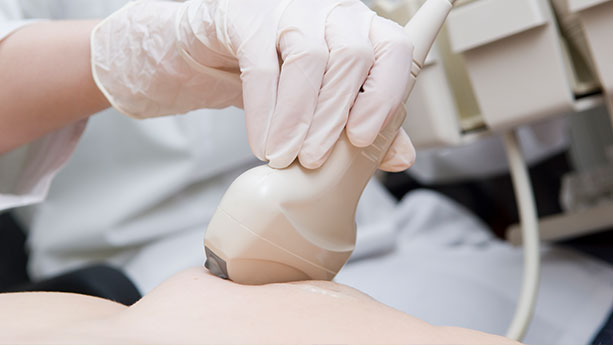The Mills-Peninsula Breast Center offers the full range of screenings and diagnostic tools in early detection and diagnosis of breast cancer.
Commonly called 3D mammography, digital breast tomosynthesis marks the newest and most important advance in digital screening mammography.
The technology improves upon the major limitation of mammography, taking multiple images of the breast to enable radiologists to detect through layers of tissue and examine areas of concern from multiple angles.
Studies show that 3D mammography reduces by 40 percent the number of women called back for additional imaging and increases by 27 percent the number of early stage breast cancers detected. Digital breast tomosynthesis uses very low-dose radiation, similar to a standard mammogram, and takes just four seconds per view. The images are available right away for the radiologist to review and can be sent instantly to your doctor.
Breast MRI and Ultrasound
A breast MRI allows a radiologist to determine the extent of breast cancer after diagnosis. It can also be used as an early detection tool in certain high-risk women and those with a known genetic mutation. An MRI uses radiofrequency waves along with a substance called gadolinium, which is injected into the bloodstream, to highlight lesions in the breast.
Breast ultrasound uses high-frequency sound waves to make images of the breast. Your doctor may use breast ultrasound as a follow-up test after an abnormal finding on a mammogram, breast MRI or clinical breast exam.
Stereotactic, Ultrasound and MRI-Guided Biopsy
These procedures may be necessary if a mammogram, ultrasound or MRI detects something that needs further evaluation. In these procedures, you will receive local anesthesia to allow the doctor to extract a tissue sample using a needle.
Multidisciplinary Doctor Review
A panel of expert physicians, including surgeons, radiologists, internists, medical and radiation oncologists and pathologists, meets weekly to review all new breast cancer diagnoses. This ensures a more accurate and coordinated diagnosis and treatment plan.
Second Opinion Service
If you’ve received imaging results from another provider, you can use our Second Opinion Service to have your records reviewed and discussed by the experts at our facility.
Breast Cancer Clinic
If you are diagnosed with breast cancer at the Women’s Center, you have an integrated support system available just downstairs at the Breast Cancer Clinic at Mills-Peninsula's Dorothy E. Schneider Cancer Center. In one appointment, you can meet with all the doctors involved in making your treatment decisions. As appropriate, we arrange individual consultations with a surgeon, medical and radiation oncologists and plastic surgeon. A nurse specialist guides you through the process.
Genetic Counseling and Testing
Depending on your family history of breast or other cancers, your doctor may recommend genetic counseling or genetic testing to look for genetic mutations that increase your risk of breast cancer. A specially trained genetic counselor will review your family health history and determine whether you have a high risk of having BRCA-1, BRCA-2 or other gene mutations. If you do, you can choose to have genetic testing performed, which only requires a simple blood sample.
Do I need a referral?
Your primary care doctor can provide you with a referral to the Women's Center or Breast Center. You also can make an appointment without a referral and we will ensure that you receive information for appropriate follow-up. Call us at (650) 696-4140 to make an appointment.













